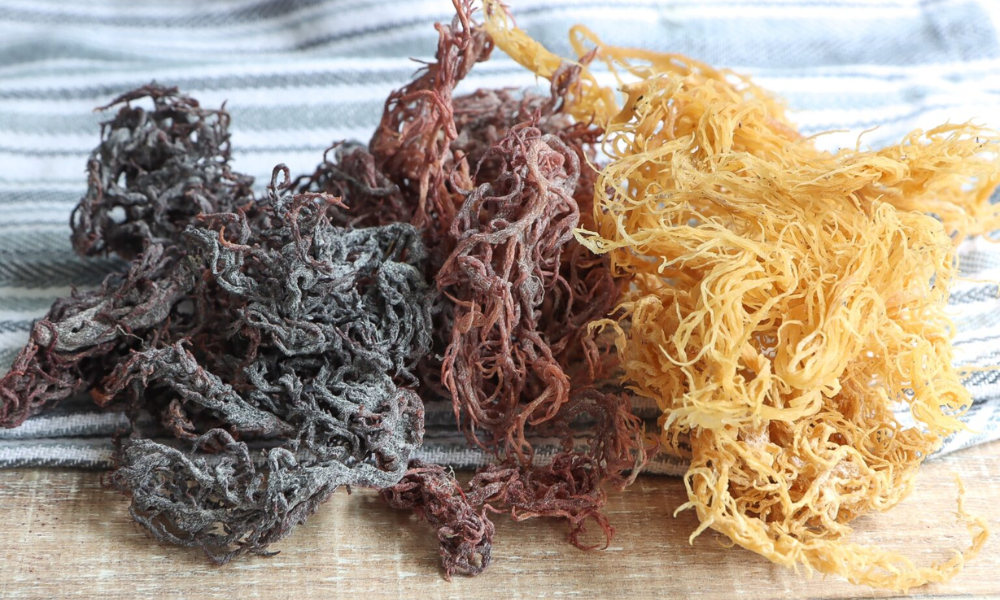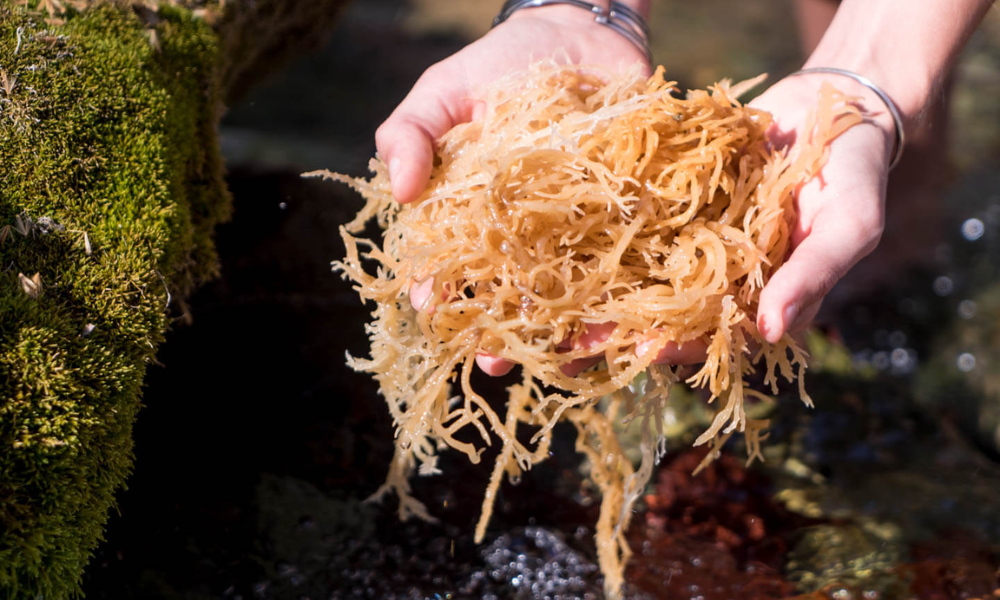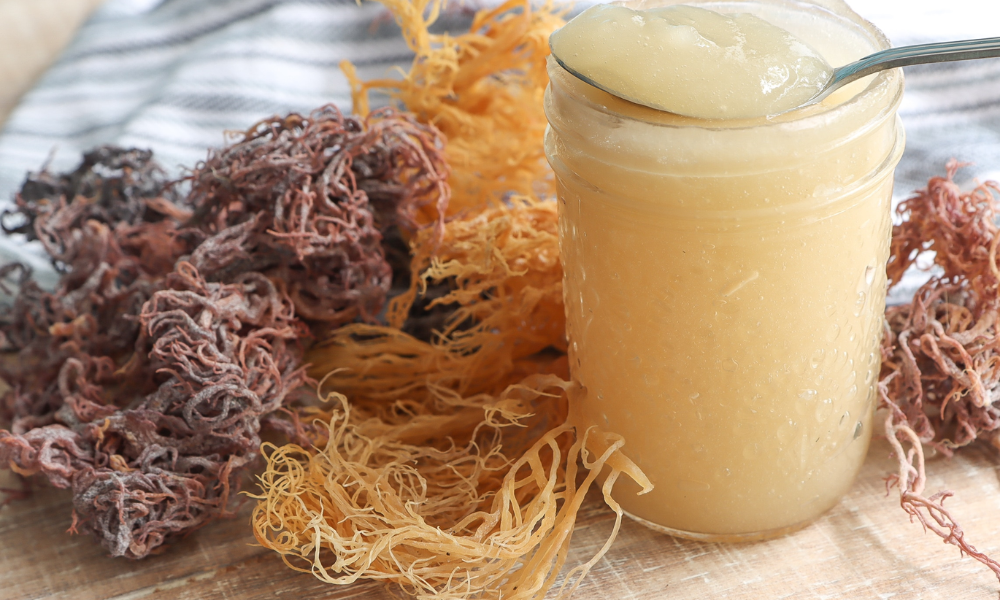Sea moss is a kind of algae or seaweed that is recognized by its scientific name, Chondrus crispus. It thrives in the waters between North America and Europe along the rocky Atlantic shores. Similar to other seaweeds, algae, and well-known green sea vegetables like kelp or dulse, it is an edible sea plant.
Sea moss can be found in several hues, including different tones of green, yellow, purple, red, brown, and black. The most prevalent species that flourish in the warmer waters are often red and are frequently referred to as Irish moss.
What is Sea Moss?
Sea moss, also known as Irish moss or carrageen moss, is a type of seaweed that grows along the Atlantic coasts of Europe and North America. It is widely used in various cuisines and has gained popularity as a natural health supplement in recent years.
Sea moss is known for its high nutritional content, including vitamins, minerals, and other beneficial compounds. It is a rich source of iodine, which is essential for thyroid function and regulating metabolism.
It also contains vitamins A, E, K, and B-complex vitamins, as well as minerals like calcium, potassium, magnesium, and zinc. In addition to its nutrient profile, it contains a type of soluble fiber called carrageenan, which has natural thickening and gelling properties.
This makes sea moss a popular ingredient in recipes such as soups, smoothies, desserts, and even skincare products. Sea moss is believed to have potential health benefits, although scientific research is limited.
It is often consumed for its potential to support digestive health, boost the immune system, promote healthy skin, and provide natural energy. Some people also use sea moss as a natural remedy for respiratory issues, inflammation, and thyroid imbalances, although further research is needed to confirm these claims.
It’s important to note that it should be properly prepared and consumed in moderation. Raw sea moss should be soaked, rinsed, and properly cleaned before use to remove any sand or debris. It can be blended into a gel-like consistency or used as a thickening agent in recipes.
What are the Benefits of Sea Moss?
It is also known as Irish moss or carrageen moss and is believed to offer several potential health benefits. However, it’s important to note that scientific research is limited, and many of its benefits are based on traditional uses and anecdotal evidence. Here are some of the potential benefits associated with it:
- Nutrient-rich: Sea moss is highly nutritious and contains a wide range of vitamins, minerals, and trace elements. It is a rich source of iodine, which is essential for thyroid function and metabolism. It also contains vitamins A, E, K, and B-complex vitamins, as well as minerals like calcium, potassium, magnesium, and zinc.
- Digestive Health: It is often used to support digestive health. It contains a type of soluble fiber called carrageenan, which may have prebiotic properties that promote the growth of beneficial gut bacteria. This can contribute to a healthy gut microbiome and support digestive function.
- Immune System Support: Sea moss is believed to have immune-boosting properties. It contains antioxidants, vitamins, and minerals that may help support immune function and provide a natural defense against infections and illnesses.
- Skin Health: Sea moss is sometimes used in skincare products due to its potential benefits for skin health. It is believed to moisturize and nourish the skin, improve its elasticity, and promote a youthful appearance. Some people also use sea moss topically to soothe skin conditions such as eczema, psoriasis, or acne.
- Thyroid Function: The iodine content in sea moss is important for optimal thyroid function. The thyroid gland uses iodine to produce thyroid hormones, which are involved in regulating metabolism, growth, and development. It may help support a healthy thyroid function, although individual needs may vary.
Is Sea Moss Edible?
Yes, it is edible and is commonly used in cooking and food preparation. It is consumed in various forms, including as a gel, powder, or whole pieces. Sea moss is known for its natural thickening and gelling properties, which makes it a popular ingredient in recipes such as soups, stews, smoothies, desserts, and even beverages like teas.
To prepare it for consumption, it is important to properly clean and rinse it to remove any sand or debris. Many people soak the dried sea moss in water overnight to rehydrate it before using it. The soaked sea moss can then be blended with water to create a gel-like consistency, which can be added to recipes as a thickening agent or consumed as is. Sea moss can also be purchased in powdered form, which can be added to smoothies, and beverages, or used as a thickener in cooking.
It’s worth noting that it has a unique taste and texture, which may vary slightly depending on the specific type of sea moss and how it is prepared. Some people enjoy the mild, slightly briny flavor, while others may find it less appealing. It is often combined with other ingredients to enhance the overall taste of dishes.
As with any food, it’s important to consume sea moss in moderation as part of a balanced diet. If you have any specific health concerns or conditions, it is recommended to consult with a healthcare professional or registered dietitian before incorporating it or any other new food into your diet.
What are the Downsides of Sea Moss?
While it is generally considered safe for consumption, there are a few potential downsides and considerations to keep in mind:
- Iodine content: It is naturally high in iodine, which is essential for thyroid function. However, consuming excessive amounts of iodine from it or other sources can lead to thyroid imbalances or complications, particularly for individuals with pre-existing thyroid conditions. It’s important to be mindful of your iodine intake and consult with a healthcare professional if you have any concerns.
- Carrageenan sensitivity: Carrageenan, a type of soluble fibre found in it, is sometimes isolated and used as a food additive. Some individuals may have sensitivity or intolerance to carrageenan, experiencing digestive issues like bloating, gas, or diarrhea. However, it’s important to note that the naturally occurring carrageenan in whole sea moss may not have the same effects as isolated carrageenan.
- Contaminants: As with any natural product sourced from the environment, there is a potential risk of contamination. Sea moss can absorb pollutants and heavy metals from the water it grows in, depending on the source and quality. It’s advisable to purchase it from reputable sources that conduct quality testing and ensure safety.
- Allergies: While rare, some individuals may have allergies or sensitivities to seaweed or marine products, including sea moss. If you have known allergies or sensitivities to these types of ingredients, it’s best to avoid them.
- Limited scientific research: Although sea moss has a long history of traditional use and anecdotal claims, scientific research on its specific health benefits and risks is limited. While it is generally considered safe when consumed in moderation, more research is needed to fully understand its effects and potential interactions with medications or medical conditions.
Can Children Consume Sea Moss?
While sea moss is generally considered safe for consumption, it is important to exercise caution when giving it to children. Here are some factors to consider:
- Age: Sea moss is not typically recommended for infants or very young children, as their digestive systems are still developing. It is best to wait until children are older and their bodies can handle a wider variety of foods.
- Allergies: Children can develop allergies to seaweed or marine products, including it. If your child has a known allergy to these ingredients, it is advisable to avoid giving them.
- Iodine content: Sea moss is naturally high in iodine, which is essential for thyroid function. However, excessive iodine intake can be detrimental to children’s developing thyroid glands. It is important to moderate the amount given to children and ensure they are not consuming excessive iodine from other sources as well.
- Preparation: It is crucial to properly clean and prepare it before giving it to children. Remove any sand or debris, soak the dried sea moss in water overnight, and thoroughly rinse it before use.
- Introduce gradually: When introducing it to a child’s diet, start with small amounts and observe for any adverse reactions or digestive issues. Gradually increase the quantity over time if no issues arise.
Conclusion
In conclusion, also known as Irish moss or carrageen moss is a type of seaweed that is believed to offer several potential health benefits. It is highly nutritious, containing vitamins, minerals, and trace elements, including iodine, which is essential for thyroid function and metabolism. Sea moss is often used to support digestive health, promote a healthy gut microbiome, and boost the immune system.
It is also associated with potential benefits for skin health and may be used in skincare products. However, it’s important to note that scientific research is limited, and many of its benefits are based on traditional uses and anecdotal evidence. As with any dietary supplement, it’s advisable to consult with a healthcare professional before incorporating it or any other new supplement into your routine, especially if you have specific health concerns or conditions.


